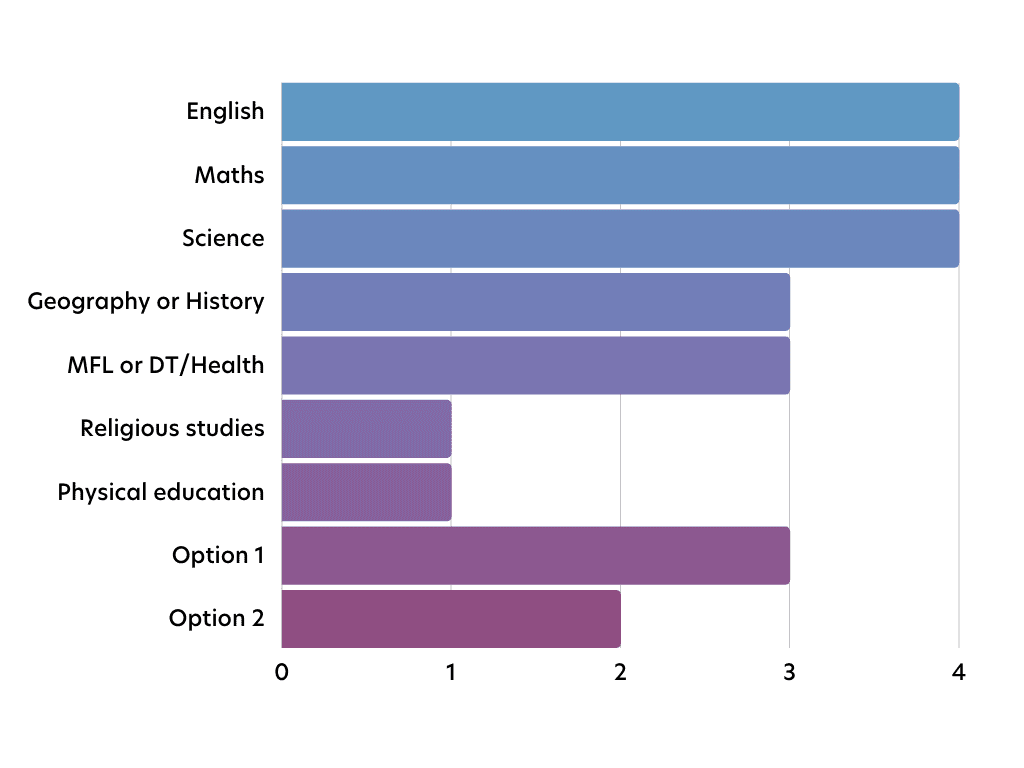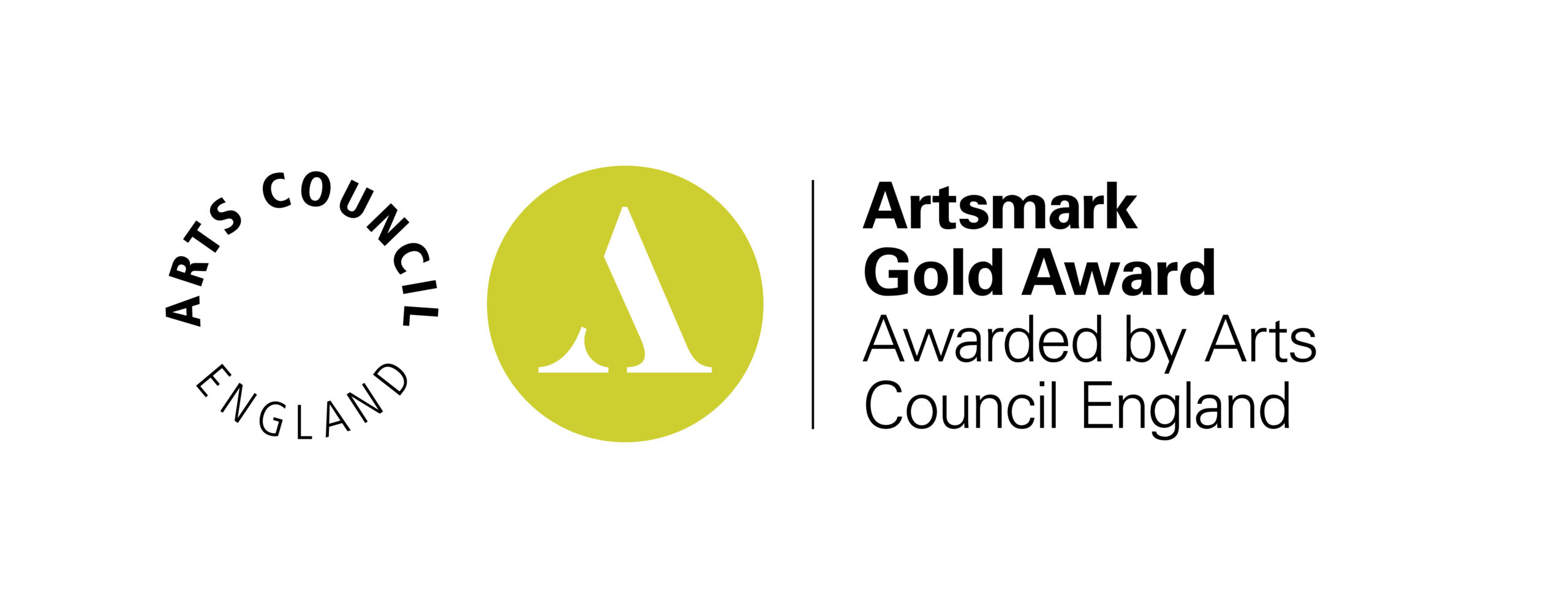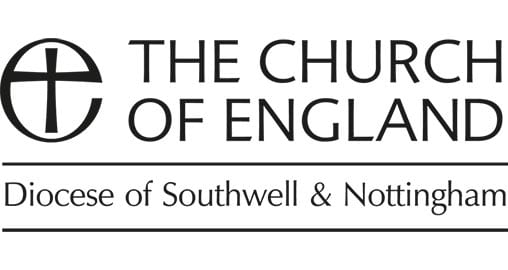In year 11 students have 25 lessons a week, these are allotted as follows:
Number of lessons per subject

Below is a general overview of the topics students are taught throughout the year in each subject.
Students on the Ebacc pathway study English language and literature, maths, physical education and religious education.
They then have three further core options: combined or triple science, geography or history and French or Spanish. After this they choose to pursue two further subjects (if they have chosen triple science this makes up one of their two options).
Students on the Non-Ebacc pathway study the same core subjects as above, however they do not pursue a foreign language and therefore have three options instead of two.
For a more in depth outline of each subject please click on the link for the subject page.
If you would like to speak to us about any aspect of our curriculum please get in touch.
Core subjects
Regardless of whether students follow the Ebacc or Non-Ebacc pathway they will study following subjects.
English language and literature
Autumn term
- GCSE English literature paper 2
- Revision of ‘An Inspector Calls’
- GCSE English language paper 1 and 2
- Reading and writing skills
- Revision of poetry
Spring term
- GCSE English literature paper 1
- Revision of ‘Macbeth’
- GCSE English language paper 1 and 2
- Reading and writing skills
Summer term
- GCSE English literature paper 1 and 2
- Revision – tailored to class needs
Maths
Autumn term
- Algebra and ratio
– Simultaneous equations
– Quadratics (further)
– Trigonometric graphs
– Recurring decimals
– Direct and inverse proportion
Spring term
- Ratio and geometry
– Rate of change (further)
– Circle properties
– Trigonometry and pythagoras (consolidation)
– Volume and surface area (non standard)
– Loci, construction and bearings (combinations of)
Summer term
- Exam preparation
Religious studies
Autumn term
- Muslim beliefs
- Crime and punishment in Islam
Spring term
- Crime and punishment in Islam
- Revision
Summer term
Revision
Physical education
Autumn term
- Football
- Netball
- Badminton
- Basketball
- Indoor games
- Fitness
Spring term
- Rugby
- Handball
- Table tennis
- Hockey
- Volleyball
Summer term
- Athletics
- Rounders
- Cricket
- Softball
- Tennis
Core subject options
Students must then choose between combined or triple science, geography or history and (for Ebacc students) French or Spanish.
Students following the Non-Ebacc pathway will need to choose an additional option in place of a language, see the optional subject list for all subject choices.
Geography
Autumn term
- Changing economic world
How is uneven development affecting different nations around the world. - Physical Landscapes
Rivers
Spring term
- Challenges of resource management
Geographical skills and revision.
Summer term
- Revision
History
Autumn term
- Elizabethan England
Spring term
- American West
Summer term
- Revision
- Exams
Combined science
Autumn term
- Ecology
- Inheritance, variation and evolution
- Chemical analysis
- Magnetism
- Space
Spring term
- Chemistry of the atmosphere
- Using resources
- Revision
Summer term
- Revision
- Exams
Triple science
Biology
Topics are designed to enable students to understand the living parts of the environment around them and how their own body works. They will learn to use a microscope, investigate how organs within the body work and how scientists monitor the environment.
Chemistry
Topics will develop students’ understanding of matter and chemical reactions between substances. They will carry out investigations to identify unknown substances and the factors affecting chemical reactions.
Physics
Topics cover the interactions between matter and energy, electricity and how the physical world works. They will learn how technology advances and how to investigate forces, magnetism and electricity.
French
Autumn Term
- My environment
- Travel and tourism
Spring Term
- School and school life
- Post 16 education and jobs
Summer Term
Revision
Spanish
During the GCSE course students will study three main themes. Each theme contains three or four topics.
• Identity and culture, covering topics such as family, friends, marriage, technology, free-time activities, customs and festivals in Spanish-speaking countries/communities
• Local, national, international and global areas of interest, including home, town, neighbourhood and region, social issues, healthy living, global issues such as the environment, poverty and homelessness, travel and tourism
• Study and employment, including topics on my studies, life at school/college, post-16 education, jobs, career choices and ambitions
Optional subjects
Additionally students choose to study two/three of the subjects listed below (two for Ebacc and three for Non-Ebacc students).
Art and design
Autumn term
- Urban landscape continued
Spring term
- Externally set assignment (exam)
Summer term
- 10 hour exam session
Child development
Autumn term
- Unit 1: patterns of child development
Students re-visit and consolidate the learning from unit 1 in preparation for the exam which is taken in January.
Spring term
- The principles of early years practice
In this unit students learn about the importance of inclusive practice and explore ways in which it is implemented in early years settings, and the positive impact that is the result. They also consider what could happen if inclusive practice is not implemented.
Summer term
- The principles of early years practice
In the second part of the unit students learn about how and why early years settings seek to empower children. Finally we consider the importance of the key person approach to supporting children’s development.
Dance
- Component 1: exploring the performing arts – internal assessment
- Component 2: developing skills and techniques in the performing arts – internal assessment
- Component 3: responding to a brief synoptic –external assessment
Design and technology
Autumn
- Substantial design and make task
- Producing a design brief and specification
- Generating design ideas
- Developing design ideas-modelling using various materials.
Spring
- Developing design ideas
- Realising design ideas-making the prototype
- Analysing and evaluating
Summer
- Revision-looking at a range of exam techniques and content
Exam preparation knowledge recall and embed
Drama
Autumn term
- Exploring genre- musical theatre: Annie
- Tech Award component 1 project:
- analysis of the musical theatre genre, intentions of the work and roles
- analysis of live performance of ‘Annie’
- practical exploration of musical theatre, through singing, dancing and acting
- application of the techniques to a musical
- create a research report, track progress in performance skills and evaluate performance work.
Spring term
- Tech award component three: responding to a brief
- Students will be given the opportunity to work as part of a group to contribute to a workshop performance as either a performer or designer in response to a given brief and stimulus
Engineering
Autumn
- Product disassembly
Students will conduct a full-scale disassembly of a product and record in detail each part of the disassembly. - Virtual 3d CAD
Students will begin to produce a CAD model and representation of the working drawing set by exam board
Spring
- Physical modelling production planning
Students will use their knowledge to make a production plan for the product designed on cad - Physical modelling prototype production
Students will manufacture their prototype from the production plan and the engineering drawing. Students will use a range of manufacturing / assembly methods to ensure that they have successfully produce their model. - Evaluation
Students will evaluate their performance of manufacturing the product they will review the production plan and review how they have performed against the speciation.
Summer
- Revision-looking at a range of exam techniques and content
Health and fitness
Unit one
Introduction to body systems and principles of training in health and fitness
Unit two
Preparing and planning for health and fitness
Health and social care
Autumn term
- Health and wellbeing
In component 3, students look at the factors that have a positive or negative influence on a person’s health and wellbeing. Students will learn how to use this information to design an appropriate plan for improving someone’s health and wellbeing, including short-and long-term targets.
Spring term
- Health and social care, values and services
In this component students look at health and social care services and explore the care values which underpin current practice. We learn about individual needs, who can support service users and the barriers that they may face in accessing services.
Summer term
- Health and social care, values and services
In the second part of the component students learn about the ways practitioners empower individuals who use care services, how the care values can be applied in a compassionate way and how different providers can work together.
Hospitality and catering
Autumn
- Refresh: health and safety training/certificate
- Theory: health and safety in hospitality and catering provision of the kitchen and front of house
- Food safety and food related causes of ill health
- The Environmental Health Officer (EHO)
- Customer requirements in hospitality and catering
- Practical: how to prepare and make dishes: prepare techniques/knives skills/cooking techniques.
- Building preparation and cooking skills and learning through practice
Spring
- Theory: the operation of the front and back of house.
- Hospitality and catering providers
- Working in the hospitality and catering industry
- Working conditions in the hospitality and catering industry
- Contributing factors to the success of hospitality and catering provision
Summer
- Theory: hospitality and catering providers.
- Working in the hospitality and catering industry
- The operation of the front and back of house
- Customer requirements in hospitality and catering
- Hospitality and catering provision to meet specific requirements
- Health and safety in hospitality and catering provision
- Food Safety
Visit our hospitality and catering page for more information
Media studies
Students will study the following media forms: television, film, radio, newspapers, magazines, advertising and marketing, social media, video games and music videos.
The course will enable students to develop:
- skills of enquiry, critical thinking, decision making and analysis
- knowledge and understanding of a range of important media issues
- appreciation and critical understanding of the media and its role in society, culture and politics
- how to understand and apply specialist terminology to analyse and compare media products, their context, and reaching conclusions about media issues
- practical skills by providing opportunities for creative media production
Music
- BTEC first award in music Unit 1/ Unit 4
Students will learn the about different types of organisations in the music industry and the type of work each undertakes. - BTEC first award in music unit 4
In this unit students will be introduced to a range of compositional concepts and techniques both past and present and will use these in the context of a client-driven music industry. - BTEC first award in music unit 1
Students will learn the about different types of organisations in the music industry and the type of work each undertakes.
Photography
Component 2 externally set assignment:
There’s a separate externally set task paper for each title. It features seven tasks and you have to complete one of them.
Students get preparation time, plus ten hours of supervised time. This is
worth 40 % of the total marks.
Religious studies (full course)
Autumn term
- Muslim beliefs
- Living the Muslim life
Spring term
- Crime and punishment in Islam
- Peace and conflict in Islam
Summer term
- Revision
Sport
- Unit one – fitness for sport and exercise
- Unit two – practical sport
- Unit three – the mind and sports performance
- Unit four – the sports performer in action




